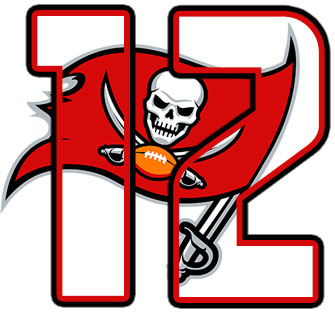When Tom Brady announced he was un-retiring, some sportsbooks cried foul
Two weeks ago, Tom Brady announced that he was un-retiring and returning to the Tampa Bay Buccaneers for at least one more season, leading to at least one bookmaker crying foul after taking some large bets on the Buccaneers to win the Super Bowl at 60/1 odds, which were set with the assumption Brady would not return.
Even though using this information is clearly wrong, if indeed the bettors were told ahead of time that Brady would be returning, there is no specific rule in the U.S. which says that using inside information to place bets is illegal, as there is with using inside information to trade stocks. It is effectively left up to the bookmakers themselves, who generally will close the accounts or at least cut limits on bettors they believe are taking advantage of insider information, particularly if a bettor does it regularly. Note this is different than bettors who past post bets (i.e., place wagers on events that have already started, but are not in-play), or bettors taking advantage of bad lines. In these cases almost all bookmakers will void bets and may close the accounts of the cheaters. But when it comes to suspected insider information, bookmakers need to make sure they have the facts straight. In relation to the bets on Brady’s Bucs, these are the questions sportsbooks will likely ask before deciding on action.
In relation to the bets on Brady’s Bucs, these are the questions sportsbooks will likely ask before deciding on action.
- Were the bets from someone close to Brady such as close friends or family members?
- Were the bets from Tampa Bay Buccaneers personnel who were told Brady would be returning?
- Were the bets connected to Brady himself?
If the answer is yes, then swift action and possibly even reporting the facts to the authorities are in order. If, however, the bets were based on a lucky guess that he would return or if they were made after hearing the news on local media, but before the bookmaker could react, then there is really nothing untoward that took place. This is the type of situation that has arisen in the UK and other jurisdictions that have had regulated sports betting for years and the gambling commissions usually have rules well laid out for all instances. And some uses of inside information were doozies.
UK Gaming Commission examples
In 2005, workers at British Telecom set up a gambling ring to bet on the results of reality shows. According to reports from the BBC, workers for the telephone company who were responsible for calculating the results of phone-in votes for shows like X Factor, Big Brother, Strictly Come Dancing and other shows where the public decides who wins or is voted out placed large last-minute bets on the Betfair exchange once they knew the outcome. By all accounts the ring had withdrawn 60,000 GBP before the accounts were frozen and the police were called in. Betfair, returned all losses to bettors who lost to the scammers and the company tried to put lipstick on a pig by saying this was a good thing because it proved bookmakers were looking into suspicious betting. But, in 2011, a similar scam was uncovered, again at Betfair, for Virgin Media workers who used inside information to bet on the X Factor.
A more egregious violation occurred in 2017, when a soccer player in the Premiere League found out that he was going to be traded, so he placed a bet with a bookmaker that he would be traded. And according to at least one other famous soccer player, it is well known that players in soccer use insider information to profit all the time. That led the Football Association to announce that it was illegal for players to wager on anything soccer related anywhere in the world or to use or pass on insider information to place wagers on soccer. And, any violators would be barred from the FA for life.
And in the most notorious insider information case, a 2007 tennis match between Nikolay Davydenko and Martin Vassallo, in an insignificant match in Poland, saw an unusually high number of bets come in Vassallo, even after Davydenko went up by a set and took the lead in the second match of the best of three match event. Davydenko suddenly started reporting injuries and withdrew from the match. Most bets were placed at Betfair, who immediately notified the ATP Tour and Betfair voided all bets saying something was fishy.
Immediately after the event an investigation was started into that match and the investigators concluded that Russian insiders knew that Davydenko would pull out in the second set, although neither player was charged or suspended since they had no definitive proof. After that incident numerous players came forward to say that betting syndicates offered them substantial sums of money to lose a set, including in major events like Wimbledon and the Australian Open.  Novak Djokovic told authorities that he was indirectly offered $200,000 to lose the first set at a tournament in Russia, which it is assumed was from the same syndicate that bet against Davydenko. Djokovic refused the offer saying he believed it was unsportsmanlike. Nevertheless, it is suspected that many big names in men’s tennis have taken money to lose the first set in major tournaments that are best of five matches knowing they would still win in the match in the end. And this type of suspiciously bad play has been noted in most individual sports including golf, athletics, darts, wrestling etc., where purposely losing a match does not affect teammates so is easy to conceal. Of course, much of this is all hearsay, but where there's smoke, there's usually fire.
Novak Djokovic told authorities that he was indirectly offered $200,000 to lose the first set at a tournament in Russia, which it is assumed was from the same syndicate that bet against Davydenko. Djokovic refused the offer saying he believed it was unsportsmanlike. Nevertheless, it is suspected that many big names in men’s tennis have taken money to lose the first set in major tournaments that are best of five matches knowing they would still win in the match in the end. And this type of suspiciously bad play has been noted in most individual sports including golf, athletics, darts, wrestling etc., where purposely losing a match does not affect teammates so is easy to conceal. Of course, much of this is all hearsay, but where there's smoke, there's usually fire.
US Betting
Naturally, this has not been as big an issue in the United States since regulated sports betting outside of Nevada was unavailable until 2017. Nevertheless, there have been many instances where players have been suspected of doing something strange and it has led to investigations.
The most famous cases were the 1919 Black Sox scandal, where the Chicago White Sox were accused of throwing the World Series against the Cincinnati Reds. More recently was the Tim Donaghy scandal, where the NBA ref was charged with match fixing after he purposely made bad calls on the floor to win bets on games that he placed with illegal bookmakers. Instead of placing the bets himself he used low level mob associates to place the bets for both him and the mob, which helped him erase a large debt he owed to the mob. Donaghy claimed that he never cost a team a game with the cheating, but rather ensured teams would not cover the point spread.
The issue with Brady is also timely, as the Financial Post recently highlighted a large growth in suspected global match fixing, as betting turnover has reached almost $2 trillion worldwide. The article noted a report from Sportradar, which said that in 2021 there were a total of 903 matches that had suspicious betting, of which 75% of the matches were on soccer. That report looked mostly at European sports, but the company said it would start following U.S. sports as well and note any unusual betting patterns, particularly as legal sports betting expands throughout the United States.
There is clearly a difference between match fixing, where a player or team purposely throws a game or shaves points and insider information, where individuals with knowledge use the information to place bets, but The UK Gaming Commission has said that both were equally bad and absolutely illegal. The UKGC published a detailed set of rules to what it calls a framework for betting integrity and highlights times when they will do an investigation into any betting that is deemed to be using insider information to place bets. These include anyone using information relating to the following circumstances:
The UKGC published a detailed set of rules to what it calls a framework for betting integrity and highlights times when they will do an investigation into any betting that is deemed to be using insider information to place bets. These include anyone using information relating to the following circumstances:
Informed Information – Where someone is given information that is not available to the public for financial gain. An example would be if an individual is told that a star player will be missing a game due to sickness or injury before that information is released to the public and media.
Restricted Information – Where someone connected to a player, such as club employees or agents is given information that can help them or others profit. An example would be if they know a player will be traded and pass this information on to others who can then place a bet on a player being traded.
Criminality of Malfunction – Where a relative or close friend of a player bets on that player’s career or knows how something works and is malfunctioning and takes advantage of that malfunction to make money.
Manipulating an Event – Where a player or someone involved in a game manipulates the result of the game or event for financial gain. An example of this would be point shaving or a player purposely playing badly to guarantee a prop bet on his performance loses.
It should be noted that uninformed information such as statistical analysis or tipsters are not considered insider information and are not illegal.
Thus far, there seems to have been no effort in the United States or elsewhere to create a similar set of guidelines or a framework clearly outlining what is legal betting and what is illegal betting, but instead the leagues have simply told players not to bet on their own sports or face consequences, as recently happened to Calvin Ridley.
So, match fixing and insider information are once again back in the news. But this time it is mostly due to Tom Brady’s un-retirement announcement only a couple of weeks after announcing he was done, causing bookmakers to cry foul after they took bets on the Tampa Bay Buccaneers at inflated odds based on Brady not returning.
There will likely be an investigation into the bets with nothing coming of it, but the situation screams for rules to be published highlighting exactly what is illegal misuse of information for betting and what the penalties are for violation of those rules. The UKGC already has a set of rules in place, so U.S. states can use those as a starting point.
Everyone knew that with gambling would come a need for rules to ensure integrity and Roger Goodell said all along that ensuring integrity was his biggest concern. So, with the Brady situation and a report of increases in match fixing, what better time is there to create the explicit rules than now?
Read insights from Hartley Henderson every week here at OSGA and check out Hartley's RUMOR MILL!







































